This post has been a year and a half in the making, so it’s another one to buckle up for I’m afraid – but I think it may be worth it. There are some interesting new discoveries revealed here – so perhaps I will finally manage to get it written. On Thanksgiving of 2021, Kelly asked me a seemingly simple, but incredibly difficult, question. “If you had to pick the most likely, specific, English origin of John Sheldon of Kingstown, Rhode Island right now, what would it be?”
She asked me this question because, by this time, we had made two research trips to England and I had studied the various Visitations for different Sheldon families, the large Bigland Pedigree, and several early Sheldon records in England. But also, because she knows how my weird brain works. I see a sort of three dimensional web of these families weaving through time and migration, influenced and pushed by the gravitational pulls of economics and politics. But trying to explain how this works in my head, or why a particular point in this web has a spotlight answer to the question, is more difficult to lay out in a series of paragraphs. I’ll just have to give it a go.
First, let’s start by mentioning that we have since come to a conclusion that John Sheldon of Kingston, Rhode Island, was most likely the son of Isaac Sheldon of Windsor, Connecticut, and therefore brother of Isaac Sheldon of Northampton, Massachusetts. Although we do not yet have any firm written documentation of this, our extensive Y-DNA study has undoubtedly proven that John was a very close relative of the two Isaac’s and all of the known facts and various oral traditions also coincide with this realization. The following will help to further illustrate this. We have written previous posts on this subject, but in summary – our current belief is that Isaac Sr was born about 1605, that his sons Isaac (c1629), and John (c1630) were born in England and that they arrived in the New World with the Rev. Hewitt to join the Dorchester company in 1639, but having found that the Dorchester company had since moved on, they followed them to Windsor, Connecticut where the first record of Isaac is written in Jan 1641.
Some of our previous posts on the subject:
- Isaac and John Sheldon: Where they brothers?
- Isaac Sheldon of Windsor is not from Derbyshire
- Gophering I
- Gophering II
But here I would like to introduce something a bit new that I am solidifying while writing this. That Isaac Sr died at Windsor in 1651 or early 1652. We have no record of death for him, but this date makes the most sense. I would also add that his wife, the mother of Isaac Jr and John, would have already passed by this time if she had ever left England at all. For it is suddenly at this time that we begin to see both sons, simultaneously, making new lives for themselves.
In Sep 1652, Isaac appears to have recently inherited his fathers home and has obtained special permission to have another young man live with him. Pay close attention to the verbiage used here (I’ve translated to modern spelling, with original wording and grammar, for ease of reading):
“It is assented that Isaac Sheldon and Samuel Rockwell shall keep house together in the house that is Isaac’s, so long as they carry themselves soberly and do not entertain idol persons to the evil expense of time by night or day”.
We can see how this verbiage, written by the elder leaders of the colony, and asking for a promise to live together soberly and not “entertain idol persons”, is the sort of thing that would be said to two young men that are asking to live together without immediate supervision. In 1652 Isaac was 22/23 years old, and it should be noted that Samuel Rockwell, born in 1631, would have been about 21. In fact, Samuel’s father, William Rockwell, was named as a neighbor to Isaac Sr in his original land record of Jan 1641 (written Jan 1640, but it is the old calendar). William Rockwell had previously died in May 1640 but his estate had not yet been settled. It was this same property that Isaac Jr would have inherited from his father, while William Rockwell’s property next door went to his widow, Susannah, who remarried to Matthew Grant in 1645 and was still living on the property in 1652. So we can see Isaac and Samuel, who would have met as boys, and as neighbors, when they were just 11 and 9 years old respectively, are now young men wanting to build their own lives and are working together toward that goal – and perhaps some much needed independence and freedom. By this time, having grown up in the colony, they had gained the respect and trust of the colony elders that they were raised with – and as further insurance to the colony, Samuels’ mother and step-father were still living next door.
But if Isaac was living alone with Samuel Rockwell in Sep 1652, where is his brother John? A month later, in Oct 1652, John first appears in Newport, Rhode Island as a witness, along with Richard Knight, to an agreement between two other men – Peter Easton and Henry Stevens. So at the same time that Isaac is beginning to keep house with Samuel Rockwell back home, John, age 21/22, is just starting off in Newport. But how would a young man of 22 manage to start a new life for himself on his own? A recent inheritance would answer that question. And why Newport? Today the trip would be 92 miles by car, but at the time it would have been much easier to travel by boat down the Connecticut River south to Saybrooke, and then east along the coast. The spring or early summer of 1652 would have been an ideal time for this trip. And while the colony at Windsor was still conservative and more oppressive, Newport was relatively free with no requirement on religion or faith. In fact, a few years later, in Jan of 1657, John was brought into court for drinking with friends and for speaking badly about the Lord Protector, Oliver Cromwell. He and his friends were let off with a warning, a small fine, and the promise they will behave better in the future. There is no further record of trouble from them. The issue there was not so much the drinking, as you might think for a more puritan society, but that the drinking lead to their open criticism of Oliver Cromwell who was at his height of power but had begun to fall to criticism with increased taxes in order to raise a new armada against the Spanish and to take Jamaica in 1655. He was, the “Lord Protector”, as named in the court proceeding, the leader of England and de facto King. To speak against him, in a group, meeting in private, was not only dangerous for them, but for all of Newport. It could have been viewed as potential treason.

So we’ve set the stage (you see why this has taken me so long? haha). A man named Isaac Sheldon, in his mid 30s, comes to the colonies with at least two young sons in 1639 with a puritan reverend, although his sons later do not appear to be particularly beholden to that line of thinking. He appears to have money as he immediately purchases a tract of land in Jan 1641, so his travel may have been less to do with religious beliefs and more for financial opportunity. Very little of this gives us much hint as to where he might have come from – but there are a couple of small hints in there. Money, and the Rev. Hewitt.
Before we continue and explain those hints, let’s look at this from the opposite perspective back in England. Isaac could be from literally anywhere in the country, so we need to do our best to narrow down the possibilities. Doing this has been a long and tedious process, but for brevity I’ll just say that we’ve narrowed all of the various lines down to just two origins – Derby and Warwickshire (with Worcestershire, Oxfordshire, Gloucestershire, and Staffordshire) – with several off shoots from both, some being NPE’s (non-paternal events, meaning the surname did not follow with the y-chromosome). DNA has shown that Isaac was NOT part of the Derby group, also sometimes referred to as the Sheldons of Bakewell – that is confirmed. So we are left with just the Warwickshire group. We have not yet found a DNA match in England for Isaac (although the descendants of sons Isaac and John are a perfect match to each other). It was also believed in England that the Warwickshire Sheldon’s had died out, which may explain the lack of an English y-chromosome match.
Now I’ll explain a bit about this Warwickshire bunch. They are an OLD and extremely large family. The confirmed lineage goes back to a Richard Sheldon of Rowley Regis, who was born in the early 14th century, but with likely origins going much further back, and even predating the surname of Sheldon. We can, potentially, trace back to an ancient Saxon named Macca/Maka who likely lived around the 7th century. His ancestry would have been a mix of the indigenous Coritani people and the Romans, along with the later arrival of the Saxons from northern Germany and Jutland in the 4th century – it’s currently hard to say which of these paths the directly male line descends from. Macca’s small land holding, his “tun”, or farm, was established just 26 miles south of the Mercian capital of Tamworth and would eventually become known as “Machitone”, as it was listed in the Domesday Book of 1086. It was at Machitone, possibly by the direct descendants of Macca, that a residence was established called Sheldon Hall. In 1189 we find our first reference of this place in a Pipe Roll, with an Oenus de Scheldon (Owen of Sheldon), paying a debt. We next have an Anselm de Scheldon in 1221 as Lord of Sheldon paying a half knights fee, he is likely the son of Owen. Then the son of Anselm, Henry de Sheldon, establishes the Church of St. Giles in Sheldon and, in 1260, gives a house and land to William de Sheldon, the parson of the church (possibly a brother). Then there are a series of scattered Sheldon records through the 1280s and 1290s surrounding land in Coleshill and Wroxall, until we get to a Nicholas de Sheldon, who in 1306 was knighted along with 266 other eligible squires of Warwickshire (eligibility requires that his father be a land holder, and therefore was most likely the son of Henry de Sheldon), at the Order of Bath at Westminster Abbey, and the subsequent Feast of the Swans. He then becomes Lord of the Manor of Sheldon in 1317. Although Nicholas died without issue in about 1349, he did have brothers to continue on the name. Sheldon Hall was leased elsewhere and went out of the hands of the Sheldon family, but the name continued and our line picks up with Richard Sheldon in Rowley Regis, born while Nicholas de Sheldon was still living, and just 14 miles west of the old Sheldon Manor. How Richard was related is unclear, but he was likely a nephew or close cousin of Nicholas. From Richard the family first establishes themselves at Abberton and Pershore during the reign of Henry IV (1399-1413), then moves on to amass multiple large estates through multiple counties, founding several different Sheldon dynasties. Most of these are well documented and clearly die out over the next few centuries, some manage to raise into the French nobility right up to the revolution. But some lines just fade away into time, and it is from one of those lines that we believe our Isaac descends.
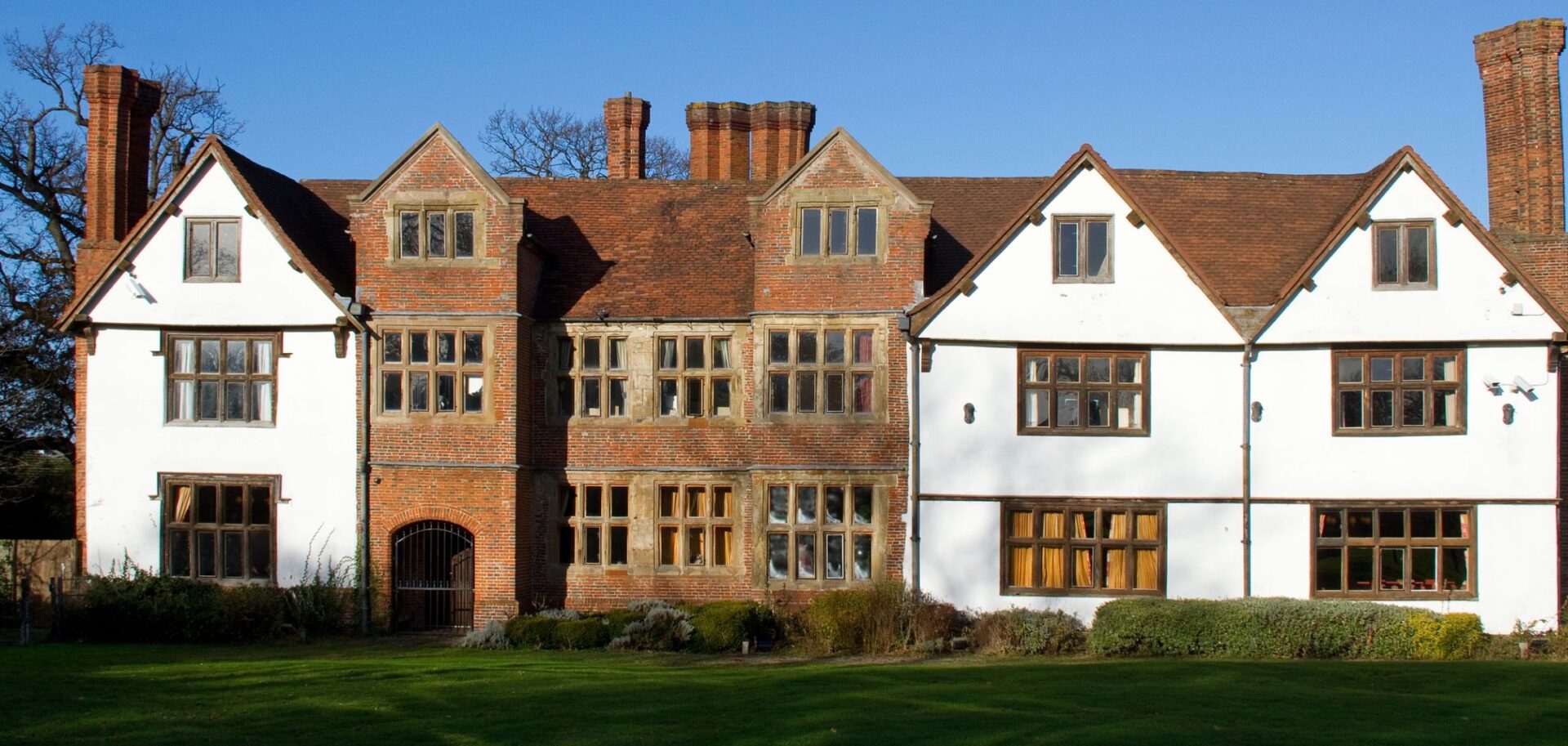
Sheldon Hall – Birmingham. Now a pizza place and cutlery.
Now let’s look back at those two hints for Isaac. The first being the Rev. Hewitt, who had a church at Solihull, a place that was central to the above mentioned extended Sheldon land holdings, further suggesting that Isaac came from that part of England and was a member of that extended Sheldon family. The second clue is that he appears to have had some money, immediately purchasing land upon arrival in the colony which would have not only required funds but immediate respectability in order to be accepted into the group so firmly. Also consider that his name was Isaac, extremely uncommon for the time for any family, but not found at all among the Sheldon’s. This tells us that he was probably not named after his father, or a grand father or an uncle, and was most likely not the eldest son of his family – or even the second or third son – but a younger son. A younger son of his family, but a branch of the family that is not so far removed from the central branch of the family that they were still able to provide him with respectability and funds in order to start new in the colonies. And, not to mention, perhaps a branch that is not so far removed from Sheldon’s with existing ties to the colonies as well. And of course, it has to be a family that was active and having children when Isaac was born in c1605.
This narrows down the options considerably. A branch close enough to still have money, but far enough to be forgotten in the pedigrees and by the later noble Sheldons who believed that they were the end of the line. This also makes it more challenging, finding forgotten lines, seemingly hidden from the record. But when Kelly asked me that question over a year ago, I had an answer – a single name. And today, while in our weekly zoom meeting (which is open to everyone and I highly encourage you all to join sometime!), I found another. There are likely more, but for now let’s stick to my current top two potential fathers to Isaac (born c1605).
First Option: Thomas Sheldon was born c1565, the 2nd son of Anthony Sheldon and Jane Lewknor. Anthony was the 2nd son of Baldwin Sheldon and Jane Wheeler, who began the branch of the family at Broadway. Baldwin was the 2nd son of Ralph Sheldon of Beoley – the central branch of the family. Being 2nd sons at each generation means that none of them inherited the bulk estate but would have been provided with a portion of their fathers holdings – which would dwindle with each generation. By the time we get down to Thomas he is still listed as a son in the Visitations and the Bigland Pedigree, but only with a note “married and had issue” – they do not name his children. Being he was born in c1565, he likely married between 1585-1590 – making him fit perfectly to have a number of children with a younger son born c1605.
Second Option: Daniel Sheldon was born c1560, the 3rd son of Ralph Sheldon and Mary Husband. Ralph Sheldon was the eldest son of Baldwin Sheldon and Jane Wheeler, making him 1st cousin to the Thomas above. What is particularly interesting is that I only learned of the existence of this Daniel today while trying to learn more about Thomas. A hint for a will popped up for Thomas that was dated in 1593. So of course we wanted to look at this closer to see what children were listed. We were disappointed at first, as the only children mentioned were unnamed daughters. But I noticed something wrong right away. This Thomas listed his “dear and beloved mother Mary” and “Elizabeth, my well beloved wife”. But the mother of our Thomas was Jane Lewknor – we didn’t have a name for his wife. It then also mentioned brothers John and Daniel – but our Thomas had brothers William and Baldwin. This could not be the same family. He also listed his “trusted and loving uncle William Combes” – which was the clue I needed to identify this Thomas as the son of Ralph Sheldon and Mary Husband. After the death of Baldwin Sheldon, his wife Jane remarried to John Combes and had another son, William Combes, who was the half-brother of Ralph Sheldon and uncle of this other Thomas. Already having this family in our database I was also able to confirm the brother John, the sister Jane (sister Anne was instead listed as Elizabeth in our records), and wife Elizabeth Hobbey. We also already knew that they had two daughters, Elizabeth and Mary, the unnamed daughters in the will. But he ALSO mentioned his brother Daniel, but this Daniel wasn’t included in the Visitations or the Bigland Pedigree. In his brothers will he is listed as the following: “Item where I do owe unto my brother Daniell the somme of seven fore pounds, I will that the same be payed unto hym and I give unto my Sister his wife twenty pounds more”
So that is where we currently are with the origin of Isaac Sheldon and his sons Isaac and John. With these leads I’ll continue to search for any records concerning these families with the hope that something is uncovered. Do you have other ideas? Any help or items you find are more than welcome. Happy hunting!
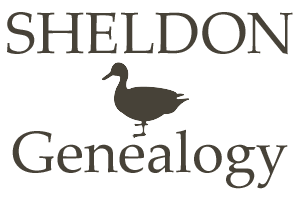
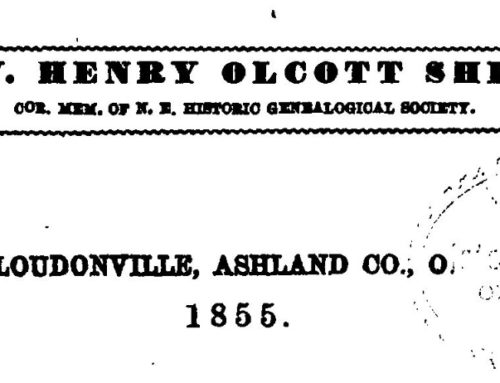

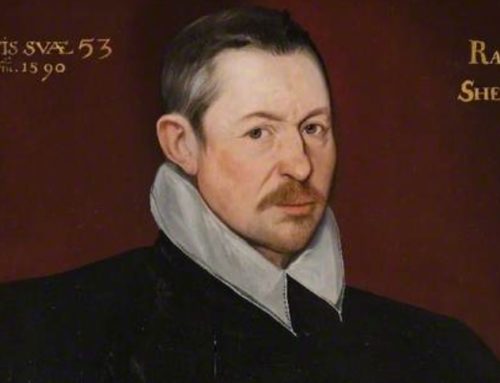

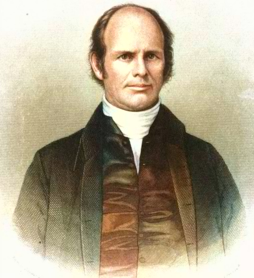
[…] I am VERY excited about this! Perhaps more than I should be, but this helps to hammer the last nail on the coffin of a century old contentious mystery over the origin of Isaac Sheldon (1629-1708) of Northampton, Massachusetts, and the assumption of many that he was the son of Ralph Sheldon and Barbara Stone of Derbyshire, England. You may want to read my last blog post on the subject for part of the puzzle: English Origins – Best Guess? […]